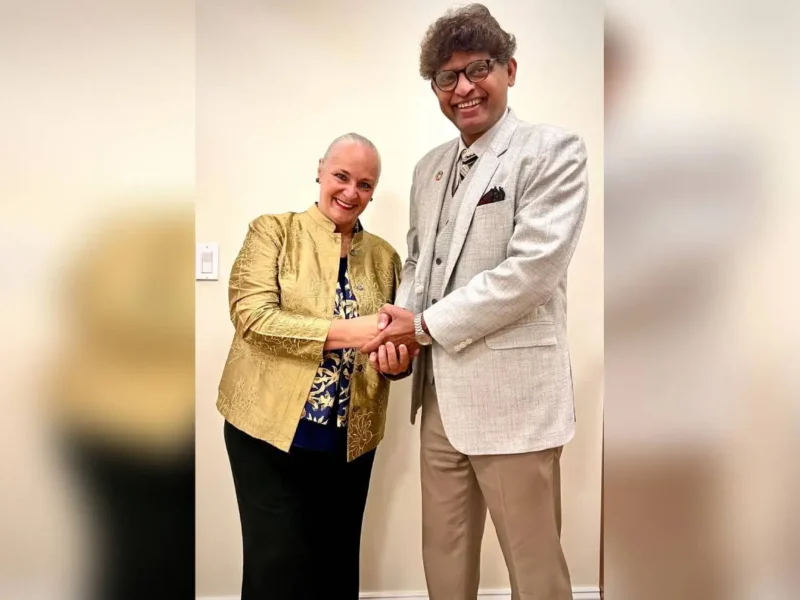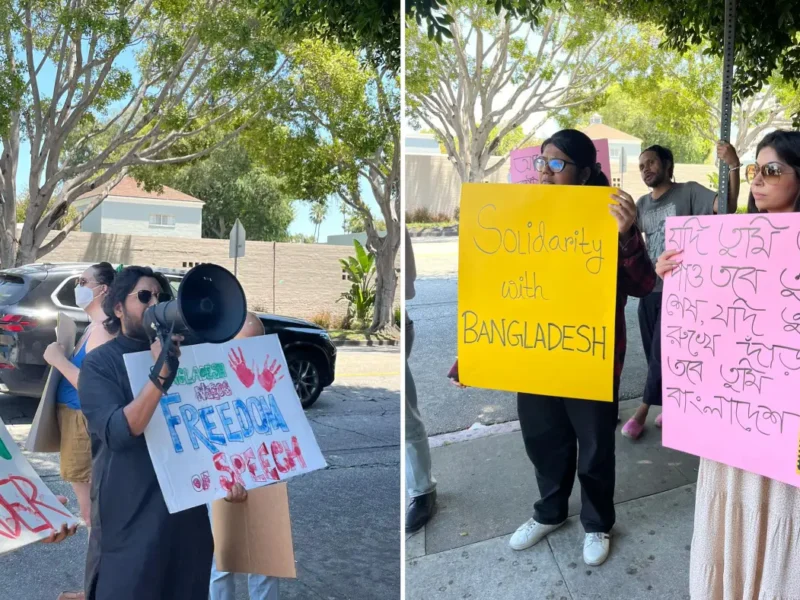Ajay Bhutoria Thanks Newsom For Vetoing Caste Bill; Looks Toward Changes In H1B Process
Ajay Bhutoria, the Deputy National Finance Chair of the Democratic National Committee, expressed his gratitude to Governor Newsom for his decision to veto SB 403.
By REENA RATHORE
SAN FRANCISCO, CA – A wide swath of Indian Americans – both for and against Senate Bill 403 – were waiting to see if Governor Gavin Newsom would sign the controversial bill that sought to explicitly ban caste-based discrimination. If signed into law, it would have made California the first state in the U.S. to add caste as a protected class to its current anti-discrimination laws.
On Oct. 7, Newsom made headlines when he vetoed the bill, calling it “unnecessary” because the existing laws already covered it.
When the bill cleared the California State Assembly, its ardent backers initiated a hunger strike, urging Newsom to sign it into law. Hundreds of opponents, too, launched a protest in Sacramento, CA, against the bill which was introduced by Sen. Aisha Wahab (D-Hayward).
Ajay Bhutoria, who had also urged the governor to veto the bill, stating it “unfairly” targeted people of Indian and South Asian origin and put businesses at risk, spoke to India-West about how it transpired for him.
During a meeting with Newsom on September 14 at the Democratic Party Fall Retreat in Chicago, Bhutoria, the Deputy National Finance Chair of the Democratic National Committee, said he along with Ramesh Kapur of Boston outlined the potential ramifications of this bill, saying it could encourage discrimination in employment and college admissions.
“Different groups within the community have been fighting against SB-403 from different angles. This bill would have created disruption in the workplace – and opened opportunities for frivolous lawsuits against South Asian origin people. Anybody can go and sue a manager, director, or vice president if they are not promoted and that would interfere with the economy and the innovation that is being done,” he said.
Questioning the claims of alleged widespread discrimination, he underscored the fact that no concrete data has been provided to show its prevalence in California except the one case that was dismissed by the Santa Clara Superior County Court. “During my conversation with the Governor, I said there was only the case of Sundar Iyer which was also later dismissed. There is no documented case in the history of California that there has been discrimination based on caste. So this bill is vague, redundant, and is not needed,” Bhutoria told India-West.
His biggest concern, he told the Governor was that even though offensive language around caste had been removed from the bill, the inclusion of caste itself as a protected category based on a vague definition leaves room for a lot of discrimination as well as a lot of lawsuits.
“I also expressed to the Governor that South Asians are strong Democrats and will continue to support him in all his future ambitions and it was important to keep them as allies,” Bhutoria recalled as saying to Newsom. “I was in profound gratitude and appreciation for the Governor, for his willingness to lend his ear to my recommendation… This significant decision demonstrates the Governor’s commitment to serving the best interest of the larger South Asian community. Everybody was expecting that since the Senate and Assembly have approved it, and since this bill doesn’t cost money, the Governor is going to approve it. But the whole community was pleasantly surprised.”
He also extended his thanks to the hundreds of community members who rallied to speak out against the caste bill. “So many of them got involved in the political process for the first time and I want them not to stop here and find opportunities to run for office…,” he said. “A key aspect is to have a seat at the table…”
Those who fought for the passage of the bill, he said, “lacked understanding” about the existing employment laws.
Bhutoria, who serves on the President’s Advisory Commission on Asian Americans, Native Hawaiians, and Pacific Islanders, is a passionate advocate for the South Asian and AAPI communities.
In 2022, Bhutoria, on behalf of the immigration subcommittee, presented a recommendation for the provision of stamping of H-1B visas in the U.S. which was approved. Currently, visa holders need to exit the country to get the visa extension stamp on their passports in order to travel freely.
The announcement of the pilot program was initially made in Feb. by Nancy Jackson, Deputy Assistant Secretary for India at the State Department, at the U.S. India Summit hosted by Bhutoria in Milpitas, CA.
During Indian Prime Minister Narendra Modi’s visit to the U.S. in June, the White House announced that it would launch a pilot to adjudicate domestic renewals of certain petition-based temporary work visas later this year, including for Indian nationals, with the intent to implement this for an expanded pool of H-1B and L visa holders in 2024 and eventually broadening the program to include other eligible categories.
Describing this as an issue of family separation and mental health, Bhutoria said this policy change would create a more efficient and humane immigration system. “People whose H1-B dates expire on the visa; they have to go back to their home country to get their stamping done. Often people get stuck there. I have met so many people whose spouses are here, but the husband is stuck there and some even lose their jobs or homes because they are not able to come back,” he said. “So we recommended the State Department should do the stamping in the U.S. That would also free up local counsellors in India, China and other countries and they could focus on other work.”
The pilot program was slated to launch in October, he said but has been pushed out to early January 2024. So far, Bhutoria has submitted 23 comprehensive recommendations for the USCIS in the commission, and five of them, sent in March 2022, centered around reducing the Green Card backlog. These included “streamlining the administrative process, asking the USCIS to implement more advanced software, and cutting down the time for approval. Some of them have already been implemented,” he said, adding that the USCIS has also implemented part of his recommendation regarding aging out kids.
The inordinate delays in the processing of their Green Card petitions put young kids of temporary workers at risk of losing their legal status.
“If a parent is stuck in a Green Card backlog for 15 years and the kid was 8 years when they started and who is now 23 is aged out,” Bhutoria told India-West. “He has to find a student visa, or an H-1B, or go back to India. So my recommendation was to subtract that 15-year waiting period from the age of the kids so that they can continue to stay.”
If fired or laid off, another challenge faced by individuals on an H-1B is seeking a new employment opportunity within the 60-day discretionary grace period. Their recommendation, which the USCIS is working on, he said, is to extend that grace period to 180 days so that they have more time to either find another opportunity or an alternate solution to safeguard their immigration status.
On Oct. 25, Bhutoria will be putting forth another recommendation which if approved would immensely ease the hardships faced by H-1B’s. Those who have applied for a Green Card, may obtain an Employment Authorization Document in order to work while their application is pending. However, the adjudicatory process for reviewing and issuing such EADs also involves lengthy wait times.
“EAD enables you to work for any employer, switch jobs, and even if your employment is terminated, you can continue to stay here. When you file I-140 and you have 5 years of backlog, USCIS should issue you an EAD card and that will take care of the 60-day termination issue, aging out kids, they can travel. It would be a huge immigration change in the country,” Bhutoria said.






Anil
/
Should have allowed the CASTE BILL to go through. Then we could have worked on banning last names like “SMITH”.
October 24, 2023